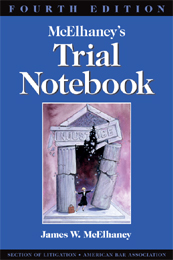« FCC Retro Walt Whitman Art Moment (with slightly flitty Poem). | Main | New O'Goldman Sachs logo. »
July 15, 2010
Depositions: Quit wasting time and money.

Formal discovery is too often this: an unimaginative, cookie-cutter, dumb-ass, straight-up lazy, wasteful, and client-unfriendly way to learn much of the background information--and many of the hard and developed facts that will frame and flesh out your case.
Roll up your sleeves, Jack, even--and maybe especially--in corporate cases. Even high-stakes corporate cases in federal trial courts may lead your staff to an American Legion hall.
Trials are always about people.
"Un-weenie" yourselves. Why use deposition time to learn things you and yours can learn quickly and inexpensively and lash together from:
Phone calls, live humans, your client, client employees, ex-girlfriends, ex-husbands, ex-bosses, bartenders, town drunks, libraries, the Moose Lodge, store clerks, hopeless gossips, old dudes in cafes who drool on their shirts, neighborhood urchins, newspaper reporters--and even the most rudimentary Google search?
Before you schedule a deposition, do some informal investigation. Next time a new case begins, resist rushing into written discovery and depositions. Step back from the discovery routine--you'll get into that bubble soon enough--and learn a few things on your own.
Twenty years ago, James McElhaney, a gifted lawyer, writer and teacher of trial tactics, and the ABA Litigation Section, first published McElhaney's Trial Notebook, now in its fourth edition.
Discovery, McElhaney noted, is a good way to learn what a witness will say, or to bind a party or witness to a particular version of the facts.
But it is also "a very inefficient way to get information."
Let us add to that:
Formal discovery can be--and often is--an unimaginative, cookie-cutter, dumb-ass, straight-up lazy, wasteful, and client-unfriendly way to learn much of the background information, and many of the facts, that will frame and flesh out your case.
This is especially true of depositions, and (for that matter) any other live sworn testimony. If you really don't have to "wing it", don't.
Think a bit on your own. Each deposition should suggest a unique set of background questions you can have answered (or partially answered) before you begin.
It's just a matter of curiosity and do-it-yourself "trolling" for information you and yours can get first-hand on your own. At a minimum, you'll have a better outline, a better deposition, and an adversary and deponent who knows you show up "ready to play".
Just as witnesses say unexpected and even startling things when they testify, useful and even surprising facts are available about opposing parties and witnesses through the Internet, court files, published cases, local boards and agencies, social clubs with websites, D&B reports, news archives, business libraries and even phone conversations other humans.
No, don't hire an investigator for this right away. You and your staff can handle this with a little verve and common sense, save money, and get steeped in the case.
It's fun. Roll up your sleeves. Un-weenie yourselves.
And why use deposition time to learn things you and yours can learn quickly and inexpensively and lash together from: phone calls, live humans, your client, client employees, ex-girlfriends, ex-husbands, ex-bosses, bartenders, town drunks, libraries, the Moose Lodge, store clerks, hopeless gossips, old dudes in cafes who drool on their shirts, neighborhood urchins, newspaper reporters--and even the most rudimentary Google search?
These inexpensive but ignored sources are often inconsistent with information parties will give about themselves in formal discovery.
The upshot?
1. Don't take the deposition at all. You may not need to take that deposition.
2. Take a much better and shorter one--and do much better written discovery requests. If you do take it, you will take a better one. You won't need to waste time asking about things which are easily ascertained beforehand. If you serve written discovery before depositions--you generally should do it before--your interrogatories and requests for documents under Rules 33, 34 and 45 will be much better. (Formal written discovery, in my view, is of even poorer quality and even less informed than most depositions taken.)
3. If you need to, confirm what you have learned with a quick series of leading questions. Anything that you have learned about the deponent from investigation and informal discovery, and that you need to confirm--i.e., work history, education, past events in the news, addresses, past titles, ex-employees, mistresses, ex-wives, published sonnets, tastes in biker bars, and current businesses and business associates? Go over it and confirm quickly at the outset (or at the right interval for that information) with the deponent.
(from previous posts)
Posted by JD Hull at July 15, 2010 11:59 PM